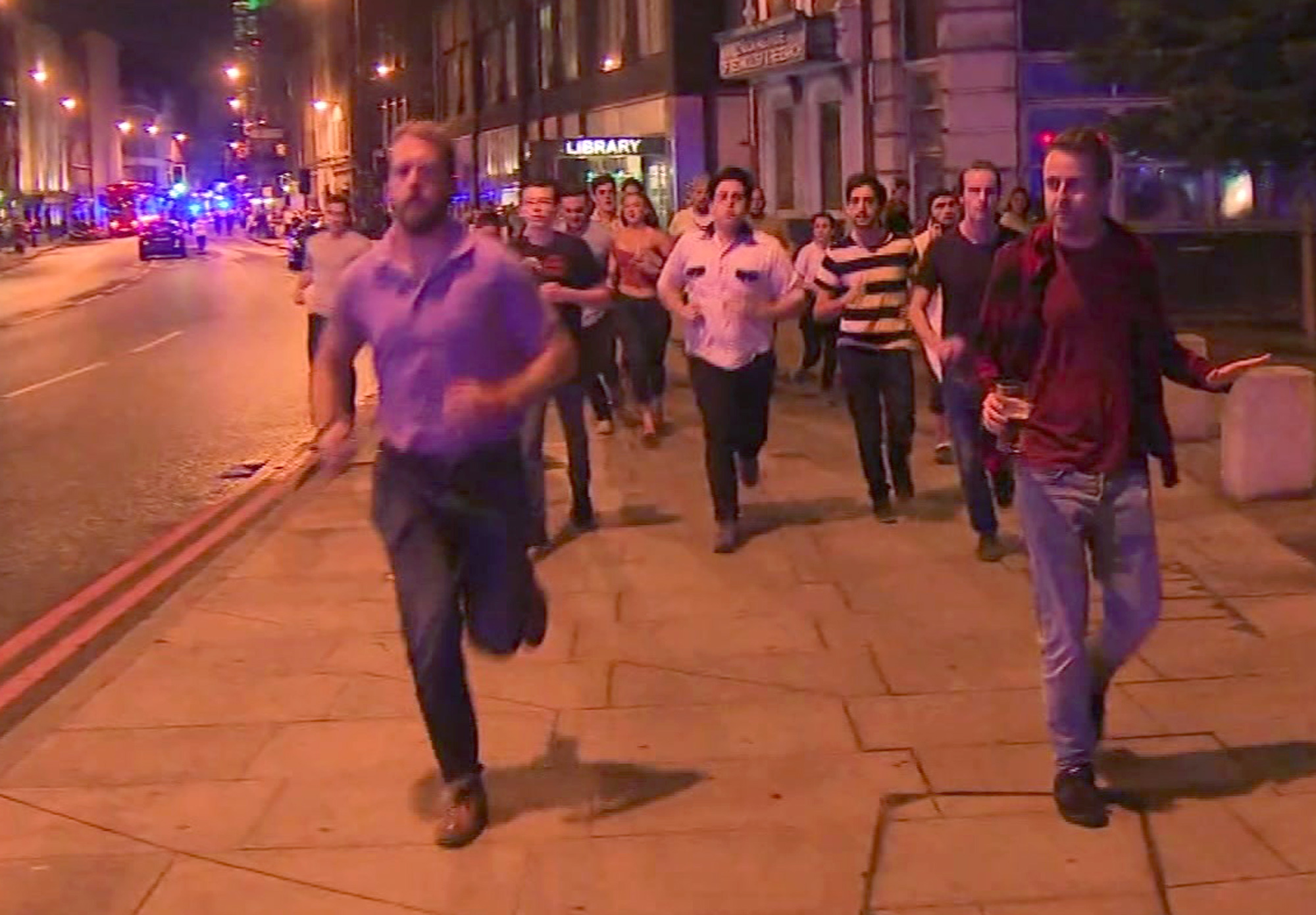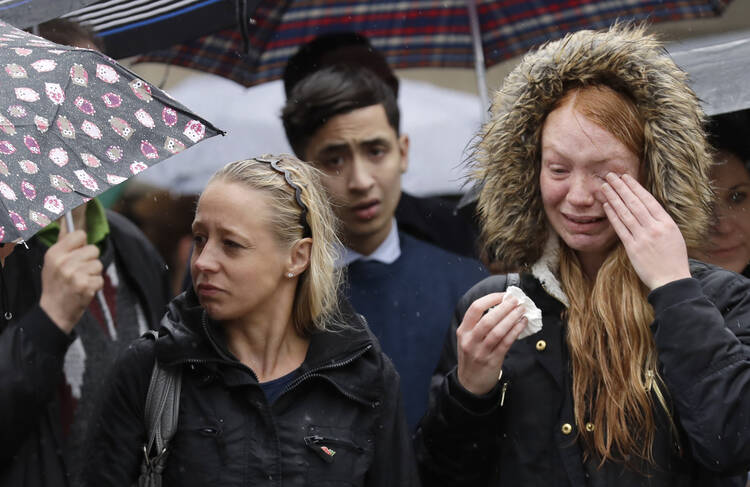Add London Bridge and Borough Market to the lengthening list of sites hit by terror attacks in European cities, three of them in Britain in less than three months. Many people in Britain observed a moment’s national silence the morning of June 6 in recognition of the victims of this most recent attack, as flags on government and public buildings flew at half-mast.
These victims, killed even as the casualties of the bombing at Manchester Arena remained appallingly vivid in the national consciousness, were predominantly young people enjoying their evenings with friends, laughter and music. But please, if you do ponder that death toll, do not forget many other awful attacks that happen in other parts of the world but do not get the same headlines.
This latest mass murder was committed while we have been enduring the run-up for a general election still felt by many to have been unnecessary, and these horrific events have changed the course of the campaign—which was possibly the intention of the attackers. Politicians have told the U.K. public that the election was about Brexit, about strengthening the hand of the incumbent Tory government as the negotiation phase of the U.K.’s European withdrawal looms.
That has all changed.
A few days before the vote, the public discussion is now mainly about security, resurfacing ugly views about immigration, and partly about the resurgence of the Labour Party. At least in England, Labour appears to be prospering against all expectations, including the expectations of its own members less than three weeks ago. (Labour’s fortunes in its traditional base of Scotland are complicated by the presence of the pro-independence Scottish National Party.) A hung Parliament looks increasingly possible, as does an ad-hoc “progressive alliance” formed to frustrate the Tories.
Labour appears to be prospering against all expectations, including the expectations of its own members less than three weeks ago.
There is widespread concern that several of the terrorists were known to the security services but slipped past the attention of London’s Metropolitan Police (known here as the “Met”) and MI5, Great Britain’s domestic security service. One of the London Bridge killers had even been seen on a Channel Four documentary about the growth of radicalized “jihadis,” some British-born. That the security agencies have foiled a number of major attacks and are trying to keep tabs on several thousand known potential attackers has not lessened public concern.
Prime Minister Theresa May is finding herself pressured in ways she presumably did not anticipate when she called this pointless election. She is now under intense scrutiny for her previous role as home secretary (the minister for internal affairs, including security), where she oversaw deep cuts to policing budgets, particularly in the capital. Ms. May, knowing that she cannot deny these accusations, has struggled to explain herself, and her campaign is on the ropes. Her slogan “Strong and Stable” has been dropped, and her handlers appear to want to keep her away from the voting public as much as possible. She has refused to face the surging Labour leader, Jeremy Corbyn, in any form of debate. Instead, personal attacks on the latter have been stepped up. Far from giving her a strong hand, the Tory strategy for the final days of campaigning looks more like a desperate bid for survival.
it is not hard to pick up a considerable level of annoyance with the United States media for giving the impression that London or all of Britain is “reeling” from the terrorist attacks.
The national mood here is somber but determined, without anachronistic appeals to the spirit of the London Blitz during World War II or to the overdone “Keep calm and carry on” posters. In conversations and on social media, it is not hard to pick up a considerable level of annoyance with the United States media for giving the impression that London or all of Britain is “reeling” from the terrorist attacks. That characterization is considered demonstrably untrue and a sign of lazy journalism. President Donald Trump’s tweeted attacks on the popular mayor Sadiq Khan, a Londoner who happens to be Muslim, have also angered almost everyone here. The prevailing view is that, though the terrorists’ purpose is to divide us, London is back at work and is open for business. But as long as the U.S. president responds with personal attacks rather than considered policy, the terrorists will be able to enjoy the spectacle of a divided opposition.

Two images of recent days capture the mood here. One was quietly playful: As Met officers urgently cleared the area around Borough Market’s many trendy bars and eateries, and as the killers rampaged only meters away, one man was photographed running up Borough High Street clutching a half-consumed pint of (warm) beer. He was not going to let these terrorists cause him to spill a single drop. The image was picked up and gladly shared.
The other image is much more somber, indeed deeply moving. The Manchester suicide bomber’s victims were young people enjoying a concert by the U.S. pop star Ariana Grande. Among the dead was 14-year-old Eilidh MacLeod, from the Outer Hebrides island of Barra, five hours by ferry from the Scottish mainland. Eilidh’s remains came home for burial, flown to the island’s famed beach airport. We saw powerful pictures of almost all of the isle’s 1,100 inhabitants attending her requiem at Our Lady Star of the Sea, the hillside church that watches protectively over Castlebay, the island’s main township.
The parish priest, Father John Paul McKinnon, said, “Eilidh was a happy girl. She had 14 happy years and in the last few days of her life she was the happiest you could ever imagine.” Scottish government minister Humza Yousaf, a Glasgow-born Muslim who came over for the Mass, tweeted as President Trump would never do, noting the “uplifting service in Barra commemorating life of Eilidh MacLeod—the Barra community has wrapped their arms around the MacLeod family.”
Pope Francis’ “urgent action” prayer intention, issued on Tuesday, asks: “May the Holy Spirit grant peace to the whole world. May he heal the wounds of war and terrorism, which most recently struck innocent civilians in London. Let us pray for the victims and their families.” This is a prayer that invites solidarity in response. That is what the terrorists want to prevent. Decent people everywhere must strive to frustrate their evil designs.











We must pray for our world & for this man who is not at peace with anyone, not even himself